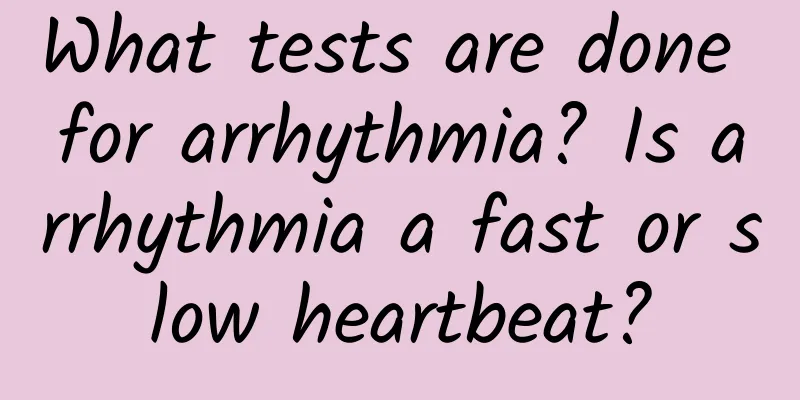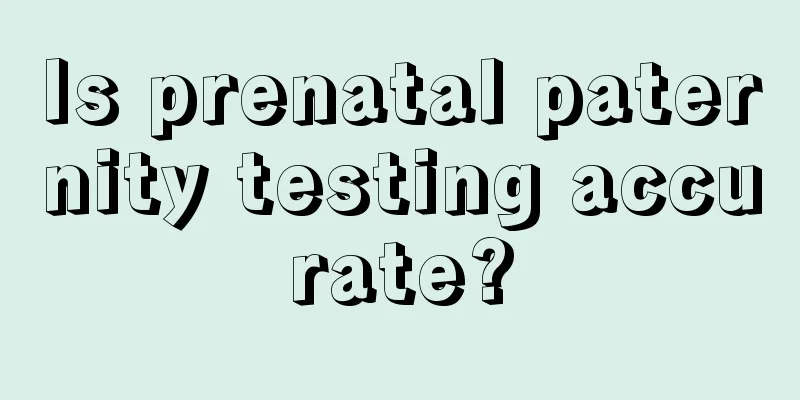What tests are done for arrhythmia? Is arrhythmia a fast or slow heartbeat?

|
Arrhythmia is easy to understand. It means that the heart beats irregularly. Arrhythmia is not a direct indication of heart disease, but it should be checked and treated in time to avoid the development of more serious diseases such as coronary heart disease. What tests are done to diagnose arrhythmia?1. Routine electrocardiogramDo an electrocardiogram when the panic attacks. Conventional electrocardiograms can only capture the electrocardiogram information at that time. If there is no panic attack at that time, the electrocardiogram will not be able to detect arrhythmia. 2. Holter testIf the palpitations are paroxysmal and recurring, this test can be done to evaluate the 24-hour ECG status. Currently, there are also some dynamic ECGs that can be done for 3 days to capture the ECG status during the attack. 3. Implantable HOLTER (LINK):For arrhythmias that occur infrequently but cause serious consequences, such as unexplained syncope, this test can be selected to clarify the nature of the arrhythmia. When the patient has symptoms, the ECG data can be manually triggered to freeze and store, and it can be immediately understood whether the symptoms are related to arrhythmia. In addition to capturing arrhythmia information, we should also actively look for the cause of the arrhythmia and perform cardiac color Doppler ultrasound to check whether there is organic heart disease such as heart failure, valvular disease, etc. In some patients, arrhythmia is caused by myocardial ischemia and requires coronary angiography or coronary CTA examination. Is arrhythmia a fast or slow heartbeat?There are many ways to classify arrhythmias. If classified according to ventricular rate, there are two types: TachycardiaIt refers to a heart rate of more than 100 beats per minute, usually caused by excessively rapid release or reentry of cardiac electrical stimulation signals, including ventricular tachycardia, paroxysmal supraventricular tachycardia, atrial flutter, ventricular flutter, atrial fibrillation and ventricular fibrillation. BradycardiaIt refers to a heart rate of less than 60 beats per minute, usually caused by a decrease in the release or interruption of cardiac electrical stimulation signals, including sinus bradycardia, sinus arrest, sinoatrial block, atrioventricular conduction block, etc. The degree of bradycardia depends on the patient's age and activity; a newborn's heart rate is usually no less than 80 beats/minute, and an athlete's resting heart rate is about 50 beats/minute or slower. What is the frequency (heart rate) of normal sinus rhythm? The heart rate range of normal sinus rhythm is usually set at 60 to 100 beats/minute. A heart rate faster than 100 beats/minute is defined as tachycardia, and a heart rate slower than 60 beats/minute is defined as bradycardia. Is arrhythmia a heart disease?Arrhythmia does not necessarily occur in patients with organic heart disease. Some arrhythmias are manifestations of organic heart disease (such as coronary heart disease, cardiomyopathy, myocarditis, heart failure, etc.), and some patients with arrhythmias may not have any organic lesions in their hearts. Generally speaking, if there is no organic heart disease, ventricular premature beats and short bursts of ventricular tachycardia will not cause serious consequences, and it is not advisable to treat them too aggressively. If the patient has organic lesions such as coronary heart disease, cardiomyopathy, heart failure, etc., these underlying diseases should be actively treated after arrhythmias occur. When choosing antiarrhythmic drugs, b-receptor blockers should be used first. Propafenone, mexiletine, incainide and other drugs should not be used, because although the latter drugs can reduce the occurrence of ventricular premature beats or ventricular tachycardia, they may increase the mortality rate because these drugs can induce more serious arrhythmias and even cause sudden death. Some people have done many tests for premature beats but have not found any heart disease, but they are still worried and continue to seek medical treatment everywhere. This is unnecessary. Such premature beats will not cause serious consequences, and overtreatment is not good, so there is no need to worry too much. |
Recommend
Will I have breast pain when I'm pregnant?
When a woman just becomes pregnant, typical early...
What causes pain on the left side of the lower abdomen in women?
During menstruation, women often experience stoma...
5 things women should do to maintain their health at night: if you do one of them right, you will be healthy
After a busy day at work, how do you spend your e...
Swelling of vaginal opening
Women should pay more attention to the care of th...
When can cupping be performed after childbirth?
Cupping is a special treatment method in Traditio...
Can a long cervix lead to a normal birth?
A short cervix is the result of growth and deve...
Can fungal vaginitis heal itself?
Many women will suffer from various gynecological...
#千万IP创科普# Shingles, the painful "assassin" that must be prevented
As autumn approaches, the temperature changes gre...
What causes women's breasts to grow larger?
Pursuing full breasts is the dream of every woman...
How to treat low estrogen?
Estrogen stimulates the development of the endome...
14 kinds of horrible and weird therapies, guess what diseases they are treating?
Modern medicine has come a long way from leeches ...
What to do if a little girl has acne on her face
It is normal for people in adolescence to get acn...
How to eat wax apples? Should I peel the skin? Can I eat the core of wax apples?
Wax apple is a tropical fruit with a very thin sk...
How effective is olive oil in preventing stretch marks?
I believe every woman who has given birth knows a...
What foods can help breast enhancement?
For women, having full and firm breasts is one of...









